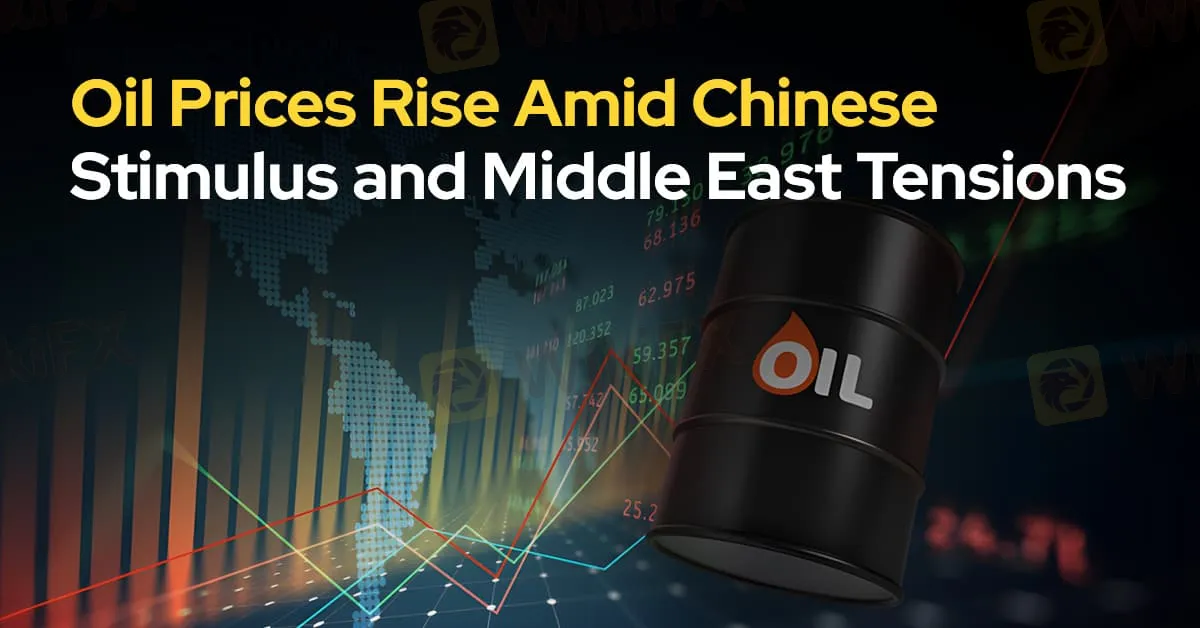简体中文
繁體中文
English
Pусский
日本語
ภาษาไทย
Tiếng Việt
Bahasa Indonesia
Español
हिन्दी
Filippiiniläinen
Français
Deutsch
Português
Türkçe
한국어
العربية
Oil Prices Rise Amid Chinese Stimulus and Middle East Tensions
Abstract:According to report, oil prices experienced a notable increase this week, with Brent crude climbing above $74 a barrel after a period of volatility.

Oil prices experienced a notable increase this week, with Brent crude climbing above $74 a barrel after a period of volatility. This rise follows a series of aggressive economic measures introduced by Chinese authorities, aimed at revitalizing the nations slowing economy. Meanwhile, escalating tensions in the Middle East, particularly involving Israel and Hezbollah, have contributed to the market's volatility.
After dipping by 0.8% on Monday, West Texas Intermediate was trading close to $71. The boost in prices can be attributed to recent announcements from Pan Gongsheng, the governor of the People's Bank of China, who outlined a comprehensive strategy to achieve the country's growth target of around 5% for the year. Key initiatives include enhanced lending capabilities for financial institutions and a reduction in the central bank's short-term interest rates, which are expected to stimulate both economic growth and energy demand in the worlds largest oil consumer.
According to Han Zhong Liang, an investment strategist at Standard Chartered Plc in Singapore, “These measures could positively impact China's demand for oil. The real challenge will be how effectively these lower rates translate into real economic activity.”
Conversely, the oil market is grappling with concerns about a faltering Chinese economy and the potential for increased supply from OPEC+, which has resulted in a 14% decline in prices over the past quarter.
In parallel, the geopolitical landscape has become increasingly tense as Israel launched a series of strikes against Hezbollah positions in southern Lebanon, leading to approximately 500 fatalities—marking the deadliest day of conflict since the 2006 war. Although Iran, a key ally of Hezbollah, has expressed a desire to de-escalate, the situation remains volatile.
As the market reacts to these dual pressures from economic policy and geopolitical tensions, the direction of oil prices will heavily depend on developments in China and the stability of the Middle East shortly.

Disclaimer:
The views in this article only represent the author's personal views, and do not constitute investment advice on this platform. This platform does not guarantee the accuracy, completeness and timeliness of the information in the article, and will not be liable for any loss caused by the use of or reliance on the information in the article.
Read more

Doo Financial Expands Reach with Indonesian Regulatory Licenses
PT. Doo Financial Futures, a subsidiary of the global financial services brand Doo Group, has secured regulatory approval from Indonesia’s Badan Pengawas Perdagangan Berjangka Komoditi (BAPPEBTI).

Investment Scams in Malaysia: Telegram Tops Scammers’ List
In the first 11 months of 2024, Malaysia recorded 5,685 investment scams, with Telegram emerging as the most commonly used platform for fraudulent activities.

WikiFX Review: Is IQ Option trustworthy?
IQ Option is catching our eye as it seems to be a trending topic. For those who want to know whether IQ Option is a reliable broker, WikiFX made this article to help you better understand this broker.

5 Questions to Ask Yourself Before Taking a Trade
Before executing any trade, traders should pause and ask themselves critical questions to ensure they are making rational and well-informed decisions. Here are five questions to help you reflect on your strategy, manage risk, and control emotions before entering the market.
WikiFX Broker
Latest News
Volkswagen agrees deal to avoid Germany plant closures
Geopolitical Events: What They Are & Their Impact?
Top 10 Trading Indicators Every Forex Trader Should Know
TradingView Launches Liquidity Analysis Tool DEX Screener
MultiBank Group Wins Big at Traders Fair Hong Kong 2024
WikiEXPO Global Expert Interview: Simone Martin—— Exploring Financial Regulation Change
'Young investors make investment decisions impulsively to keep up with current trends' FCA Reveals
Why Do You Feel Scared During Trade Execution?
CySEC Settles Compliance Case with Fxview Operator Charlgate Ltd
Malaysian Influencer Detained in Taiwan Over Alleged Role in Fraud Scheme
Currency Calculator


